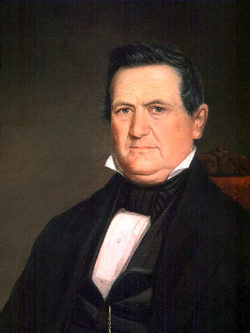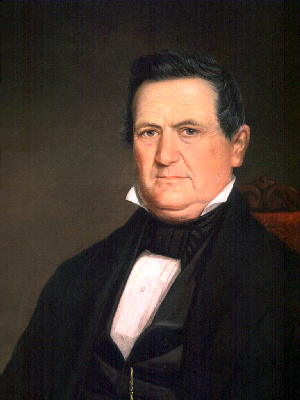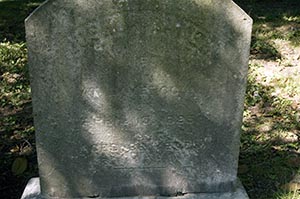In 1825, Baker married Fanny Assherton from whom they had three children before she died on August 17, 1831. From 1826-1829 Baker was a Colonel in the Louisiana State Militia. He also worked on Engineering projects in Plaquemines Parish until 1829, when he was appointed Judge in St. Mary Parish; a position he held until 1839.
His second marriage to Catherine Patton from Fairfax, Virginia in 1832 produced 2 children and In 1833 he was Assistant State Engineer for the State of Louisiana until 1838 and then Director of Public Works for the State of Louisiana 1840-1845. He was made Captain of Cavalry, Louisiana State Militia 1846 until 1851 and in 1853 he was appointed to the Board of Visitors United States Military Academy, serving until 1861.
At the outbreak of the Civil War in 1861, Colonel Baker retired to Franklin, Louisiana. A Conservative Democrat who opposed secession, he chose to cooperate with the Union Army of Occupation thus, on January 8, 1868, Baker took the Oath of Loyalty to the Union and was quickly appointed Military Governor by General Winfield Scott Hancock upon the resignation of Benjamin Flanders.
As Governor, Baker supported the lenient reconstruction plan of President Andrew Johnson although hi administration has little influence on the course of the Louisiana government. On March 10, 1868, Governor Baker was arrested and brought before a commissioner charged with perjury for claiming not to build a barricade across Bayou Teche. Meanwhile, General Hancock unilaterally removes 9 New Orleans City Councilmen which results in President Ulysses S. Grant's reversal of this order. For this, Hancock asks to be reassigned. With Hancock's departure, support for Governor Baker evaporated and in a special election Republican Henry C. Warmoth was elected Governor.
Baker had outlived two wives and all his children except for his daughter Margaret Van Bergen whose home in Lyme, Connecticut, "Cricket Lawn," was where he died. He was interred on April 17, 1885.∼BAKER, Joshua, military governor of Louisiana. Born, Mason County, Ky., March 23, 1799; son of Col. Joshua G. Baker (1763-1816), a member of the 1799 Kentucky constitutional convention, a member of the Mississippi Territory's legislative council (1805-1808), and an officer in the Mississippi territorial militia, and Susannah Lewis (1768-1813). Removed with parents to St. Mary Parish, La., 1810. Married (1) Frances Asheton "Fanny" Stille (1809-1831) of Natchez, Miss., daughter of Capt. James Stille and Margaret Cyrilla Watts, the widow of former Governor Manuel Gayoso de Lemos (q.v.). Children: Anthony Wayne (b. 1826), Margaret C. (b. 1828), and Carolina Lewis (d. 1861). Studied law at Litchfield, Conn., 1820s; later admitted to bar in Kentucky and Louisiana. Married (2), December 22, 1832, Catherine F. Pullon. Two children. Education: Private tutors; U. S. Military Academy (West Point), was graduated in 1819. Returned to Louisiana ca. 1820 and became an engineer and builder; continued to function as such throughout the antebellum period despite subsequent change in vocation; built the 1850 St. Mary Parish courthouse. Active in Democratic party; parish judge, St. Mary Parish, 1829-1832. Later served in state senate and on State Board of Public Works. Opposed secession, 1861, and remained a Unionist throughout the Civil War. Elected to U. S. Congress from Union-occupied Louisiana, November 1863, but refused to travel to Washington and take his seat. Supported Andrew Johnson's Reconstruction policies; appointed military governor of Louisiana by Gen. Winfield S. Hancock (q.v.), January 1868; held post until succeeded by Henry Clay Warmoth (q.v.), July 13, 1868. During tenure in office, was little more than a figurehead for Union military authorities. Shortly after taking office, notified Hancock that state government was bankrupt, prompting the general to take stringent measures to account for all state funds. Assistant state engineer, 1875. Subsequently suffered financial reverses and retired to daughter Margaret's (Mrs. John P. Van Bergen) home in Lyme, Conn. Died, Lyme, Conn., 1886.
In 1825, Baker married Fanny Assherton from whom they had three children before she died on August 17, 1831. From 1826-1829 Baker was a Colonel in the Louisiana State Militia. He also worked on Engineering projects in Plaquemines Parish until 1829, when he was appointed Judge in St. Mary Parish; a position he held until 1839.
His second marriage to Catherine Patton from Fairfax, Virginia in 1832 produced 2 children and In 1833 he was Assistant State Engineer for the State of Louisiana until 1838 and then Director of Public Works for the State of Louisiana 1840-1845. He was made Captain of Cavalry, Louisiana State Militia 1846 until 1851 and in 1853 he was appointed to the Board of Visitors United States Military Academy, serving until 1861.
At the outbreak of the Civil War in 1861, Colonel Baker retired to Franklin, Louisiana. A Conservative Democrat who opposed secession, he chose to cooperate with the Union Army of Occupation thus, on January 8, 1868, Baker took the Oath of Loyalty to the Union and was quickly appointed Military Governor by General Winfield Scott Hancock upon the resignation of Benjamin Flanders.
As Governor, Baker supported the lenient reconstruction plan of President Andrew Johnson although hi administration has little influence on the course of the Louisiana government. On March 10, 1868, Governor Baker was arrested and brought before a commissioner charged with perjury for claiming not to build a barricade across Bayou Teche. Meanwhile, General Hancock unilaterally removes 9 New Orleans City Councilmen which results in President Ulysses S. Grant's reversal of this order. For this, Hancock asks to be reassigned. With Hancock's departure, support for Governor Baker evaporated and in a special election Republican Henry C. Warmoth was elected Governor.
Baker had outlived two wives and all his children except for his daughter Margaret Van Bergen whose home in Lyme, Connecticut, "Cricket Lawn," was where he died. He was interred on April 17, 1885.∼BAKER, Joshua, military governor of Louisiana. Born, Mason County, Ky., March 23, 1799; son of Col. Joshua G. Baker (1763-1816), a member of the 1799 Kentucky constitutional convention, a member of the Mississippi Territory's legislative council (1805-1808), and an officer in the Mississippi territorial militia, and Susannah Lewis (1768-1813). Removed with parents to St. Mary Parish, La., 1810. Married (1) Frances Asheton "Fanny" Stille (1809-1831) of Natchez, Miss., daughter of Capt. James Stille and Margaret Cyrilla Watts, the widow of former Governor Manuel Gayoso de Lemos (q.v.). Children: Anthony Wayne (b. 1826), Margaret C. (b. 1828), and Carolina Lewis (d. 1861). Studied law at Litchfield, Conn., 1820s; later admitted to bar in Kentucky and Louisiana. Married (2), December 22, 1832, Catherine F. Pullon. Two children. Education: Private tutors; U. S. Military Academy (West Point), was graduated in 1819. Returned to Louisiana ca. 1820 and became an engineer and builder; continued to function as such throughout the antebellum period despite subsequent change in vocation; built the 1850 St. Mary Parish courthouse. Active in Democratic party; parish judge, St. Mary Parish, 1829-1832. Later served in state senate and on State Board of Public Works. Opposed secession, 1861, and remained a Unionist throughout the Civil War. Elected to U. S. Congress from Union-occupied Louisiana, November 1863, but refused to travel to Washington and take his seat. Supported Andrew Johnson's Reconstruction policies; appointed military governor of Louisiana by Gen. Winfield S. Hancock (q.v.), January 1868; held post until succeeded by Henry Clay Warmoth (q.v.), July 13, 1868. During tenure in office, was little more than a figurehead for Union military authorities. Shortly after taking office, notified Hancock that state government was bankrupt, prompting the general to take stringent measures to account for all state funds. Assistant state engineer, 1875. Subsequently suffered financial reverses and retired to daughter Margaret's (Mrs. John P. Van Bergen) home in Lyme, Conn. Died, Lyme, Conn., 1886.
Family Members
Advertisement
Advertisement








